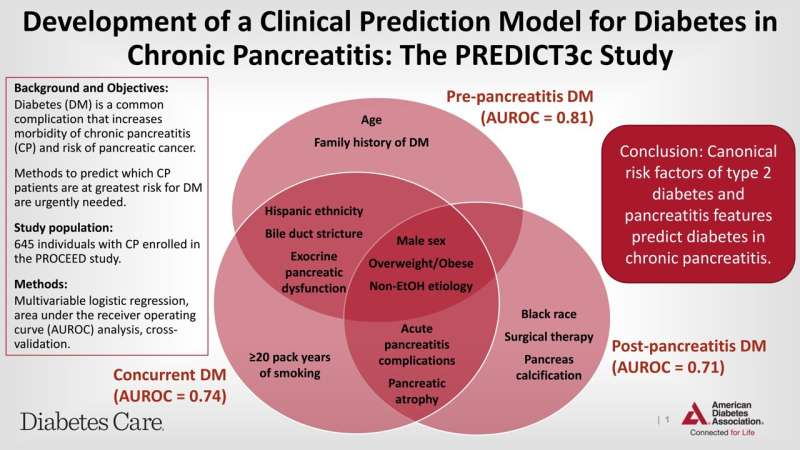Study: Which people with chronic pancreatitis will develop diabetes?

A new study by Cedars-Sinai investigators describes risk factors that could make it more likely for people who have chronic pancreatitis, an ongoing inflammation of the pancreas, to develop diabetes. The findings are published in Diabetes Care.
Some of these risk factors include smoking and being overweight.
"What we're hoping to do with this information is to build prediction models that clinicians can use to manage patients with chronic pancreatitis who don't yet have diabetes," said Mark Goodarzi, MD, Ph.D., the Eris M. Field Chair in Diabetes Research at Cedars-Sinai and senior author of the study.
"We can look at these factors and say, 'This patient is at high risk of developing diabetes within X number of years,' allowing us to identify patients we need to follow closely to help prevent diabetes."
About 5 to 12 people for every 100,000 in industrialized nations such as the U.S. will develop chronic pancreatitis, according to the National Pancreas Foundation. When the pancreas experiences chronic inflammation, it can become damaged, which prevents the organ from helping the body to digest food. Many studies show most people with chronic pancreatitis will eventually develop diabetes.
For this study, investigators collected information from 645 people with chronic pancreatitis enrolled in a study called Prospective Evaluation of Chronic Pancreatitis for Epidemiologic and Translational Studies (PROCEED). Of the people enrolled in PROCEED, 276 had diabetes. Their ages ranged from 18 to 75. The investigators compared factors known to increase risk for Type 2 diabetes, such as tobacco and alcohol use, after being diagnosed with chronic pancreatitis. They found that:
- Men were more than twice (2.42) as likely as women to develop diabetes.
- People who were overweight or obese were almost three times (2.76) more likely than people with a normal weight to develop diabetes.
- People who identified as non-white were more than twice as likely (2.33-2.53) than those who identified as white to develop diabetes.
- Smokers were more than twice (2.08) as likely as nonsmokers to develop diabetes.
- Older people were more likely to develop diabetes; the odds of developing the disease increased 3% per year of a person's life.
The characteristics of a person's pancreatic disease, including having a condition called exocrine pancreatic dysfunction, also contributed to individuals' risk factors.
"Known risk factors for Type 2 diabetes as well as pancreas-specific features such as calcium deposits in the pancreas or shrinkage of the pancreas predicted who developed diabetes among persons with pancreatitis," said Christie Jeon, ScD, a research associate professor in the Department of Medicine, research scientist at the Samuel Oschin Cancer Institute at Cedars-Sinai, and first author of the study.
For some people, it might be possible to change behaviors associated with diabetes risk.
"Models that predict diabetes risk could encourage clinicians to connect patients with weight loss or smoking cessation programs," said Goodarzi, director of the Division of Endocrinology, Diabetes and Metabolism at Cedars-Sinai.
Investigators are currently following a larger group of patients to learn whether the same risk factors uncovered in this study predict who develops diabetes in that population. Future studies will analyze how genetics and insulin and hormone levels may predispose people with chronic pancreatitis to diabetes risk, according to the authors.
More information: Christie Jeon et al, Development of a Clinical Prediction Model for Diabetes in Chronic Pancreatitis: The PREDICT3c Study, Diabetes Care (2022). DOI: 10.2337/dc22-1414


















